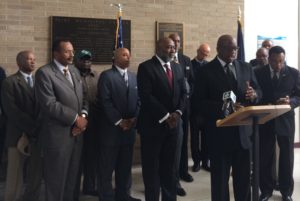By Jan Worth-Nelson
A powerful consortium of Flint clergy, the Concerned Pastors for Social Action, a group which has consistently weighed in in support of Mayor Karen Weaver, today stood in the lobby of Flint City Hall and delivered a blistering salvo at the Flint City Council.
In particular, they directed their ire at Councilman Scott Kincaid, who Pastor Reginald Flynn of Foss Avenue Baptist Church said was engaging in “plantation politics” and should apologize. At least one speaker, later identified as not a pastor and who said he was speaking as a citizen and not for the Concerned Pastors, called for Kincaid to be recalled.

Pastor Allen Overton (at mic) addresses the media and about 40 supporters at Flint City Hall.
What set off the pastors, according to Pastor Allen Overton, who led the remarks, were comments reported in The Flint Journal Friday in which Kincaid said the council had tabled three motions at their Sept. 26 meeting to “teach the Mayor a lesson.”
According to Friday’s Flint Journal, Kincaid said, “…the mayor believes she can enact things without the approval from this legislative body,”
“I think that this council needs to send a loud and clear message to the mayor that she’s not a dictator,” the Flint Journal reported that Kincaid said.
Overton called Kincaid’s comments “unmerited, unwanted and unprecedented,” adding that “taking personal jabs at the Mayor of the City of Flint cannot be tolerated.”
“Our mayor is not some little slave girl,” Flynn said. “She is the chief executive officer of this city and her position demands our respect. And so what you have before you are several clergy who are standing in unity, crossing racial and denominational lines, and saying ‘enough is enough.’ Time out for the gamesmanship.”
Flynn added that Kincaid’s comments and the council’s actions had “descended into the depths of political immaturity.”
“The faith community is watching”
Amid a chorus of amens and “yeah, Reverend,” and “that’s right,” from those in the crowd, Flynn continued, “The faith community is very much watching, and are going to be very much involved in the process of ensuring that the mayor that WE elected is able to carry out her duties and functions as we have asked her to do through the electoral process. So we stand here in unity today informing the senior city councilman and those aligned with him, watch what you do.”
Pastor Herman Miller of Metropolitan Baptist Tabernacle, who came to Flint 13 months ago from North Carolina, where he also served as a city council member, said since coming to Flint, what he has observed has been “frustrating, disheartening, and sometimes downright embarrassing.”
Miller called Flint’s city government “fractured and dysfunctional” and declared, “we have continued to digress and devolve into a cesspool of personality conflicts, incessant fighting and stagnation, and all this during a time that the citizens of Flint need us the most.
“It concerns me because people across the United States are watching what is going on in Flint, the people in Lansing are watching. Right now we are justifying the notion that we do not have the capacity to govern ourselves. The citizens of Flint need us standing together fighting for them and not fighting with one another.”
He said he wished he could “lock all of them up in a room somewhere” until they got on the same page.
Citing the African proverb, “When two elephants fight, only the grass suffers,” Miller concluded, “I implore all our elected officials to cease all the name calling and do everything within your power to turn our city around.’
The declarations from the Concerned Pastors are the latest chapter in an ongoing dispute between the mayor and the council over who will pick up trash in the city of Flint. The Mayor favors Rizzo Environmental Services and the city council, by an 8-1 vote, have continued to argue for Republic Services, who have been Flint’s trash contractors since they were selected by then-emergency manager Ed Kurtz in 2013.
Water activist sees connections to EMs
The dispute has been going on since June, when the city council voted against hiring Rizzo, whom she said had offered “the lowest responsible bid.” She then vetoed the council vote, leading to a series of suits by the council, with Kincaid the key figure in seeking injunctions to stop the switch to Rizzo.
One of those watching the Concerned Pastors’s presentation was water activist Claire McClinton, who bemoaned how the latest dispute has, she said, usurped the city’s focus on solving the water crisis. And she said she sees something deeper at work, asserting that the “emergency manager political model and the water problem are one and the same.”
She said, “We would not even be talking about garbage had not the EM, Ed Kurtz, outsourced the garbage, and sold our trucks. This is what happens when you privatize stuff.”
She added, “The city’s water problems go back to the emergency management and the privatization of the city’s trash. This is what you get — the perception of corruption, back room deals — all of this gets engendered when you privatize. That has been lost in the debate.”
The tabled resolutions by the City Council leading to Kincaid’s remarks had to do with contracts for re-roofing the City Hall North Building, a three-year contract with an engineering firm for switchgear maintenance, and a contract with a private firm to conduct residential rental inspection services.
Attempts to contact Kincaid and Council President Kerry Nelson were not successful today — possibly because they were in a court-ordered mediation session about the trash dispute with city officials in the courtroom of Circuit Court Judge Joseph Farah.
As for the trash, when asked who would be picking up trash in the city this week, Steve Branch, Mayor Weaver’s chief of staff, said, “I have no idea.”
EVM editor Jan Worth-Nelson can be reached at janworth1118@gmail.com.


You must be logged in to post a comment.